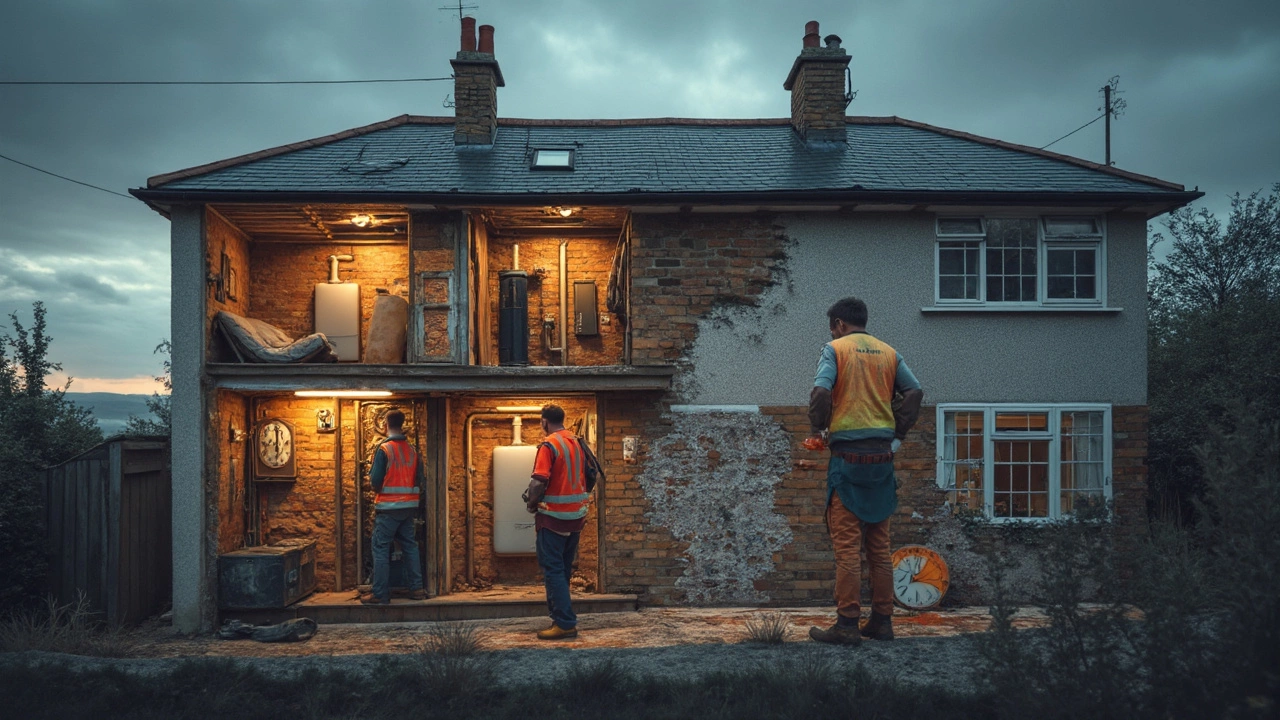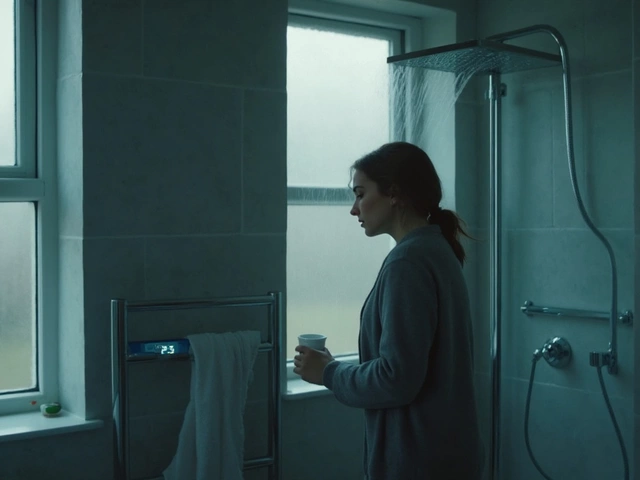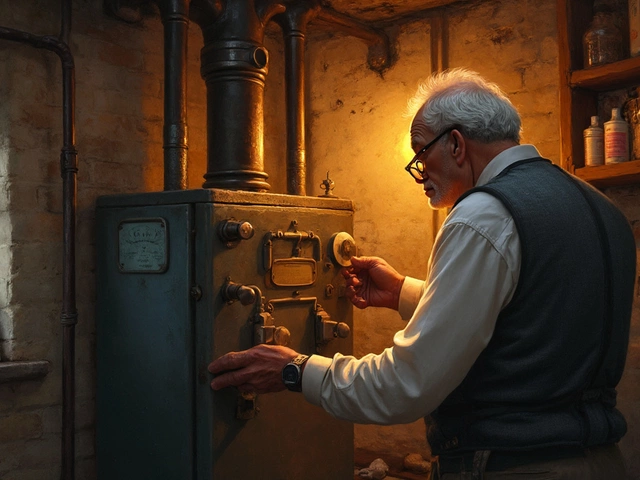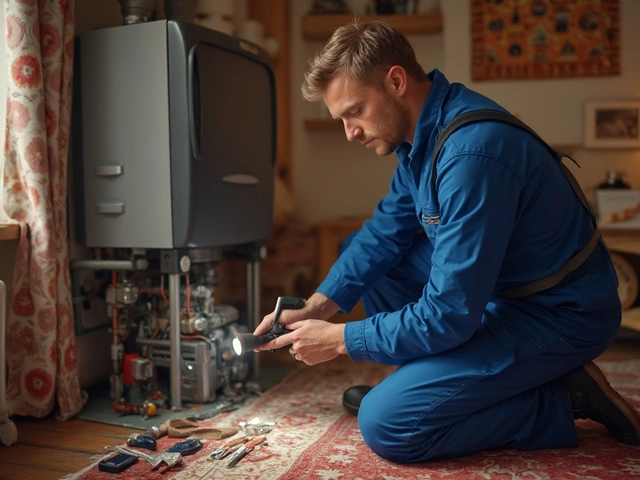Imagine this: winter’s biting cold, and suddenly your boiler wheezes its final breath. No one wants that kind of surprise. So, the big question—how long can you really count on your boiler?
If you’re like most homeowners, you probably cross your fingers every time you switch on the heat. But boilers aren’t built to last forever. They usually soldier on for 10 to 15 years, and some tough ones make it to 20 with lots of care. Still, their lifespan isn’t just about age. How you treat your boiler makes a massive difference.
Skipping routine checkups or ignoring weird noises is like asking for an early breakdown. On the other hand, a good yearly service adds years to your boiler’s life. Picking the right size and type for your home also helps dodge constant repairs or early replacement.
- Average Lifespan of Boilers
- What Wears Boilers Out Fast?
- Signs Your Boiler Is Near the End
- Tips to Make Your Boiler Last Longer
Average Lifespan of Boilers
Here’s what most people want to know: How many years will my boiler actually last? On average, a well-built boiler can keep going strong for about 10 to 15 years. Sure, there are stories of boilers making it to 20 years or more, but that usually happens when someone’s on top of maintenance and isn’t running the system into the ground.
Different types of boilers also play a part. Standard gas boilers are usually good for 10 to 15 years, while cast iron models sometimes push past that. Electric boilers might tap out a little sooner if they’re working overtime in a bigger home. Oil boilers, if serviced every year, tend to land in that same 10-to-15-year range too.
The key thing to know: the boiler lifespan shrinks if you skip those yearly services, ignore weird knocking sounds, or let leaks go on too long. Regular checkups and fast repairs make all the difference. Manufacturers’ warranties give you a hint—those usually run about 7 to 10 years, and it’s rare for warranties to stretch beyond that unless you pay extra for extended plans.
- If your boiler is already older than 15 years, start saving for a new one. It won’t last forever.
- Got a system that’s still running great at age 12? It’s time to watch for warning signs. Don’t wait until it leaves you shivering on a cold morning.
- The house you live in, the size of your boiler, and how hard it has to work matter, too. Smaller homes with the right-sized boiler see less wear and tear.
What Wears Boilers Out Fast?
If your boiler keeps acting up, there’s usually a reason. Most boilers don’t just quit; years of wear and tear slowly chip away at them. Bad habits and a few common problems are like fast-forward on your boiler’s clock.
Here’s what really gives boilers a hard time:
- Skipping maintenance: Imagine never taking your car for an oil change and then acting surprised when something goes wrong. That’s what happens to boilers without a yearly service. Dirt builds up, parts corrode, and problems stay hidden until a breakdown.
- Hard water: If there’s a lot of minerals in your water, scale starts piling up inside the boiler. That saps efficiency and puts extra pressure on the system. A UK study found that scale buildup can cut a boiler’s energy efficiency by up to 12%.
- Short cycling: When boilers turn on and off way too often, that’s called short cycling. It’s rough on the internal parts, and it usually means your boiler is too big, too small, or has some other glitch. Short cycling wears out components fast.
- Corrosion: Water and metal just don’t get along. Over time, leaky pipes or even moisture in the air can eat away at the inside of your boiler. Corrosion’s subtle, but it’s a killer for boiler lifespan.
- Poor installation: If your boiler was installed by someone who ‘kind of knows what they’re doing,’ you’re just waiting for trouble. Incorrect setup leads to strain on the system and maybe even voids your warranty.
- Old controls and sensors: Thermostats and safety sensors eventually get glitchy or stop working altogether. Without them, your boiler can’t regulate temperature and pressure right, which strains the system.
| Factor | Estimated Reduction in Lifespan |
|---|---|
| No annual servicing | Up to 5 years lost |
| Hard water (high limescale) | 3-4 years lost |
| Poor installation | 2-4 years lost |
| Frequent short cycling | 2-3 years lost |
| Ongoing corrosion | Up to 5 years lost |
If you want your boiler to hit that 15-year mark or beyond, avoiding these boiler-killers is half the battle. The rest? That’s just staying on top of simple tasks each year.

Signs Your Boiler Is Near the End
Boilers usually don’t just quit out of nowhere—they leave a trail of warnings. Knowing the signs will save you from the hassle and cost of a total breakdown in the middle of winter.
Here’s what you need to look out for:
- Frequent breakdowns: If your boiler keeps acting up and you’re calling the repair guy more than once a year, that’s a huge red flag.
- Strange noises: Banging, gurgling, or whistling sounds aren’t normal. They can mean there’s buildup inside or parts wearing out.
- Uneven heating: If one room is toasty and another is freezing, your boiler’s struggling to do its basic job.
- Spiking energy bills: Seeing a big jump in your heating costs? Old and worn boilers lose efficiency fast—sometimes dropping below 60% efficiency near the end of their life.
- Leaks and water pooling: Any water around the boiler is a warning the seal or pipes may be shot.
- Pilot light or ignition troubles: If the pilot keeps going out or you notice a yellow flame instead of blue, you’ve got a combustion issue.
- Aging past the 12- to 15-year mark: Even with the best care, most boilers start developing problems once they're over a decade old.
Here’s a quick comparison of common end-of-life signs, what they mean, and how urgent they are:
| Warning Sign | What It Means | Action Needed |
|---|---|---|
| Frequent repairs | Multiple parts are failing | Plan for replacement |
| Streaks of soot or burning smell | Poor combustion, possible carbon monoxide leak | Call a pro ASAP |
| Cold spots in the home | System can’t circulate heat properly | Check for blockages, consider upgrade |
| Rising bills | Lost boiler lifespan and efficiency | Energy audit, boiler checkup |
| Rust or leaks | Water damage, risk of floods | Fix leaks, weigh replacement |
Ignoring these signs won’t make them go away—if anything, the problems get worse and more expensive. If any of this sounds familiar, it might be time to think about a replacement instead of squeezing out another winter.
Tips to Make Your Boiler Last Longer
Want your boiler to keep humming for those full 15 years—maybe even longer? It really comes down to how you look after it. Simple routines and quick fixes now can save you the headache of a chilly night and a fat repair bill later. Here’s what makes the real difference.
- Boiler lifespan gets a major boost from yearly maintenance. Don’t skip annual checkups from a certified engineer. They’ll spot issues like blocked pipes or unsafe leaks before they turn into expensive disasters.
- Keep the pressure in check. Low pressure means your boiler won’t heat properly and stresses all the moving parts. Take a peek at the gauge every few months and top up if needed (your boiler’s manual should show you how).
- Watch for strange noises. Bangs, gurgles, or whistles usually mean trouble is brewing—could be a buildup of sludge or air in the system. Call in a pro early, and you’ll avoid bigger repairs.
- Dust and dirt clog up your boiler’s insides. Vacuum around it a couple of times a year, and make sure air vents aren’t blocked.
- Install a magnetic filter. It keeps metal bits and sludge away from your boiler’s core, so everything runs smoother and lasts longer. It’s a cheap upgrade with big benefits.
- Finally, use your heating system year-round. Even in summer, turn it on for ten minutes once a month. This stops parts from seizing up and keeps internal valves moving freely.
Stick with these tips, and your boiler will last longer, stay safer, and work better when you need it most. A bit of effort now goes a long way in avoiding a freezing surprise.




